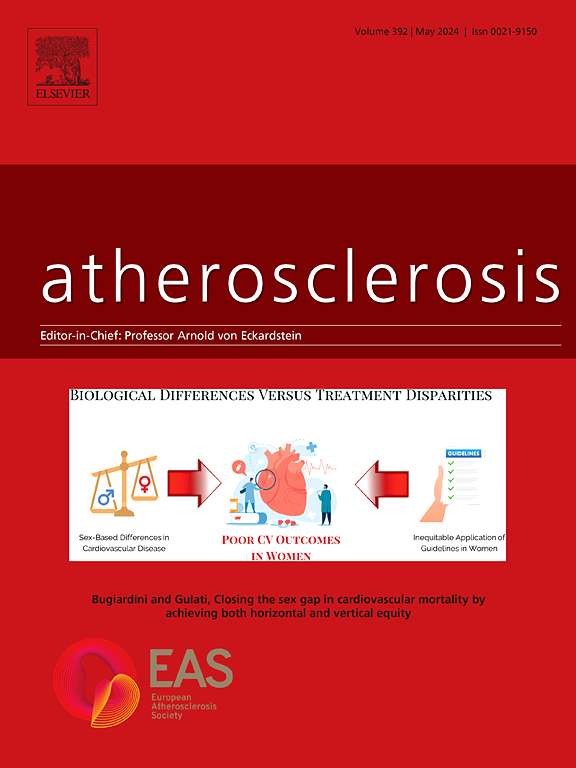Reprogramming human macrophages in symptomatic carotid stenosis: Stabilization of atherosclerotic carotid plaques
IF 5.7
2区 医学
Q1 CARDIAC & CARDIOVASCULAR SYSTEMS
引用次数: 0
Abstract
Background and Aims
Inflammation is a precursor to atherosclerotic plaque destabilisation, leading to ischaemic events like stroke. Since macrophage phenotypes can be influenced by their microenvironment, we aimed to stabilise plaques and reduce the risk of recurrent ischaemic events using clinically relevant anti-inflammatory agents.
Methods
Thirteen carotid plaques from stroke/Transient Ischaemic Attack (TIA) patients undergoing carotid endarterectomy were analysed using immunofluorescence stain to identify macrophage markers (CD68, CD86, MRC1). An in vitro model of human blood-derived macrophages was used to evaluate the effects of statins and glucocorticoids on macrophage-specific markers using RT-qPCR, Western Blot, and immunofluorescence staining. The physiological effects of dexamethasone on macrophages and human carotid plaques were further studied ex vivo.
Results
The macrophage population (CD68+) in the carotid plaques was dominated by “double-positive” (CD86+MRC1+) macrophages (67.8 %), followed by “M1-like” (CD86+MRC1-) (16.5 %), “M2-like” (CD86-MRC1+) (8.7 %) and “double-negative” (CD86-MRC1-) (7.0 %) macrophages. M1-like macrophages were more prevalent in unstable plaque sections than stable ones (p = 0.0022). Exposure to dexamethasone increased macrophage MRC1 gene expression in vitro and ex vivo. It also reduced the expression of the Oxidised Low-Density Lipoprotein Receptor 1 (OLR1) gene and protein, leading to reduced oxLDL uptake in foam cell assays.
Conclusions
Clinically relevant concentrations of glucocorticoids may shift human macrophages to a less inflammatory state, thus reducing their ability for oxidised LDL uptake. In contrast, this anti-inflammatory mechanism was not observed in response to statins. These findings suggest that glucocorticoids could help prevent ischemic events in patients with advanced atherosclerosis.

重编程无症状颈动脉狭窄的人类巨噬细胞:稳定动脉粥样硬化颈动脉斑块
背景和目的:炎症是动脉粥样硬化斑块不稳定的前兆,导致中风等缺血性事件。由于巨噬细胞表型可受其微环境的影响,我们旨在使用临床相关的抗炎药物来稳定斑块并降低复发性缺血事件的风险。方法对13例脑卒中/短暂性缺血发作(TIA)患者行颈动脉内膜切除术后的颈动脉斑块进行免疫荧光染色,检测巨噬细胞标志物(CD68、CD86、MRC1)。采用体外人血源性巨噬细胞模型,采用RT-qPCR、Western Blot和免疫荧光染色技术,评价他汀类药物和糖皮质激素对巨噬细胞特异性标志物的影响。在体外进一步研究地塞米松对巨噬细胞和人颈动脉斑块的生理影响。结果颈动脉斑块内巨噬细胞群(CD68+)以“双阳性”巨噬细胞(CD86+MRC1+)为主(67.8%),其次是“m1样”(CD86+MRC1-)(16.5%)、“m2样”(CD86-MRC1+)(8.7%)和“双阴性”(CD86-MRC1-)(7.0%)。m1样巨噬细胞在不稳定斑块中比稳定斑块中更普遍(p = 0.0022)。地塞米松暴露增加巨噬细胞MRC1基因在体外和离体的表达。它还降低了氧化低密度脂蛋白受体1 (OLR1)基因和蛋白的表达,导致泡沫细胞检测中氧化低密度脂蛋白的摄取减少。结论:临床相关浓度的糖皮质激素可使人巨噬细胞进入较低的炎症状态,从而降低其氧化LDL摄取的能力。相反,这种抗炎机制在他汀类药物的反应中没有观察到。这些发现表明糖皮质激素可以帮助预防晚期动脉粥样硬化患者的缺血事件。
本文章由计算机程序翻译,如有差异,请以英文原文为准。
求助全文
约1分钟内获得全文
求助全文
来源期刊

Atherosclerosis
医学-外周血管病
CiteScore
9.80
自引率
3.80%
发文量
1269
审稿时长
36 days
期刊介绍:
Atherosclerosis has an open access mirror journal Atherosclerosis: X, sharing the same aims and scope, editorial team, submission system and rigorous peer review.
Atherosclerosis brings together, from all sources, papers concerned with investigation on atherosclerosis, its risk factors and clinical manifestations. Atherosclerosis covers basic and translational, clinical and population research approaches to arterial and vascular biology and disease, as well as their risk factors including: disturbances of lipid and lipoprotein metabolism, diabetes and hypertension, thrombosis, and inflammation. The Editors are interested in original or review papers dealing with the pathogenesis, environmental, genetic and epigenetic basis, diagnosis or treatment of atherosclerosis and related diseases as well as their risk factors.
 求助内容:
求助内容: 应助结果提醒方式:
应助结果提醒方式:


